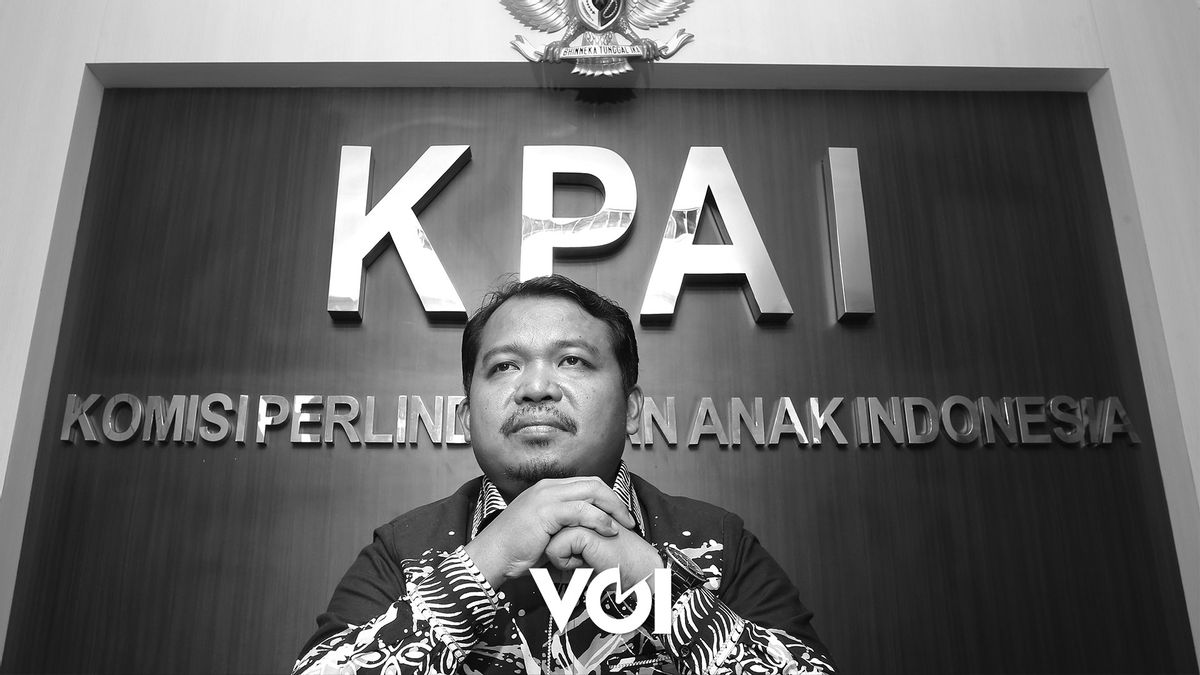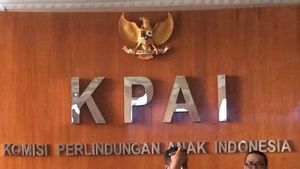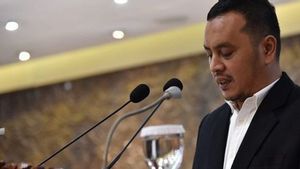Human trafficking develops along with technological advances. The more advanced the development of technology, the more advanced the pattern used to commit this crime. Because of that, what Dr. Susanto, MA. said, as a Chairman of the Indonesian Child Protection Commission (KPAI) this should be the concern of all parties. This transnational crime leads to a new pattern that demands parents, law enforcement, the government, and all parties who are concerned about the future of their children to increase their vigilance.
***
Indeed, the legal apparatus in Indonesia is very much in favor of law enforcement for crimes of violence against children, including human trafficking. This issue is included in the constitution and existing legislation. It's just that the development of this crime is sometimes a step faster than the existing rules. So that Dr. Susanto, MA., this is a challenge for all parties.
"Indeed, the pattern of human trafficking cases continues to shift from traditional manual patterns, to new patterns that are not easily detected by those closest to children. In the past, when digital media was not developed, in many parts of the world, including in Indonesia, these crime cases used the usual patterns. You have to meet, you have to be at an event, then there's a chance that crime can happen. And also done with other patterns which are actually relatively easier to detect. With the rapid advancement of technology, the perpetrators of human trafficking crimes also use new patterns through digital media, and through social media," he said.
Through this new pattern, the people closest to the child sometimes do not know that the child is being targeted by a predator. "The father and mother do not necessarily know that the child is being targeted by the perpetrators of the crime of human trafficking. Things like that should be the attention of those closest to children who already use social media and often surf in cyberspace," said the man who had won an award from the Minister of Education and Culture of the Republic of Indonesia, Prof. Dr. Muhadjir Effendy, MAP., as the best article writer at the national level in 2016.
During the COVID-19 pandemic alone, Susanto said, KPAI received reports of 493 allegations of sexual violence against children. This is data collected from the beginning of the pandemic around the beginning of March 2000 to June 2021. Complaints made by the public because it is still a pandemic are carried out online. This is a red light for all parties. And what needs to be remembered is that this crime is like an iceberg phenomenon. What is seen is little but what is not seen is more. Due to various factors, the victim did not report to the KPAI or related agencies for what had happened. What are the problems with Indonesian children today? Dr. Susanto, MA., explained this to Edy Suherli, Savic Rabos, and Rifai from VOI.ID who met him at the KPAI Office, Teuku Umar Street, Menteng, Central Jakarta recently. Here is the full excerpt.

What are the problems faced by Indonesian children today?
The situation of Indonesian children today is certainly different from before COVID-19. The COVID-19 pandemic has complex impacts related to the fulfillment of children's nutritional rights, the fulfillment of their health, the fulfillment of playing for children which is also limited, the fulfillment of education that expects the current situation, where the services must also be new child-friendly services and of course with various innovations. This is definitely different from the situation before the COVID-19 outbreak. With today's situation, many children also tend to be bored with monotonous learning patterns, of course, this must also be a concern for those involved in the education unit. Another thing that is also our note is related to the number of children who have lost their parents, both partially or partially due to COVID-19. This is a big record for the country, because it requires special efforts.
Cyber crime is currently increasing because the intensity of our children using digital media is indeed quite high, while literacy for children, for those closest to them; to caregivers, parents, it is still limited. This creates vulnerability for our children, vulnerable to exposure, and even vulnerable to being perpetrators. That's how much we record after this pandemic.
During the COVID-19 pandemic, children's problems are getting more complex?
Yes, it is getting more complex, especially in several issues, health issues, education issues, and parenting issues. Parents also become more burdened, if, in the past, parental participation in the learning mentoring process was still within the limits of proportion. In this COVID-19 situation, parents must accompany their children intensively because if we don't worry our children will not be optimal in participating in the learning process.
Child abuse based on the Convention on the Rights of the Child (1989) can be in the form of physical, sexual, emotional violence, neglect, and exploitation. For Indonesian children, what is the reality like?
This is confirmed from the results of the 2020 survey in the COVID-19 situation, a few months after COVID-19, we photographed how far the actual situation of children in the COVID-19 situation was. We conducted a national survey in 34 provinces with more than 25,000 children as respondents, of course, this can actually take pictures with a certain age range from late elementary school to junior high and high school. From this survey, it turns out that in this COVID-19 situation, children are vulnerable to physical violence, verbal abuse from those closest to them. The perpetrators included the mother, father, grandfather, and grandmother, then her brother and closest relatives of the victim as well as the caregiver. This is a yellow light for all parties.
It seems that there must be a total evaluation of the parenting style, it must be child-friendly. There should be no reason because, during this pandemic, parents will be laid off, or their working hours will be reduced, income will also decrease, then children are vulnerable to being used as objects of violence. Whatever the form of violence, whether physical, verbal, or psychological, it should not happen.

What is the reality about sexual crimes against children?
Until June 2021, there were 493 cases of sexual violence against children whose complaints were submitted online to the Indonesian Child Protection Commission. Cases of sexual violence like this are actually quite advanced in terms of our country's policies, although there are some things that really need evaluation. The indicator is first from the side of protecting children from violence, it is also included in the 1945 Constitution, not all countries include it in the constitution. Some countries for example only up to the law. This means that none of our children should be victims of violence, discrimination, including sexual violence.
Second, we also have Law No. 23 of 2002 concerning Child Protection, then some of the articles were changed to Law No. 35 of 2014 concerning Child Protection, and Law No. 17 of 2016 concerning Stipulation of Government Regulations in Lieu of Law Number 1 of 2016 concerning the Second Amendment to Law Number 23 of 2002 concerning Child Protection into Law. My friends call this Law of Castration, there are two that have been added, namely 81 and article 82 which were later revised into law.
In terms of substance, there has been some progress, for example, there are weights for perpetrators. In the past there was no weighting for it in Law No. 35 of 2014. The law explicitly states that perpetrators of sexual violence, such as teachers, officers who work for the Child Protection Commission, parents who commit sexual crimes against children, they receive a heavy sentence, plus 1/3 of the existing criminal threats. The problem is that they are supposed to be protectors, but they turned out to be perpetrators.
Has the punishment of castration been implemented for perpetrators of sexual crimes against children?
The debate is extraordinary, the pros and cons of this matter. In England, the concept of castration is social work. There are also other countries based on court decisions. Castration is actually a rehabilitation so that the person concerned does not commit the same crime. The problem is that there are cases of child sex offenders who have already served their sentences, but after being released, they act again. This must be a concern for prisons so that the perpetrators do not commit their actions again after being released.
So is there a deterrent effect for potential perpetrators?
Yes, that's about it. But that needs attention, because in some cases, all parties focus too much on the perpetrators of sexual crimes against children, while the victims are forgotten. Victims of violence must get complete rehabilitation. Moreover, if there are many victims, a serious, simultaneous, and complete investigation must be carried out so that the fact-finding of the victims is truly maximal. Why is it because if there are later they are not identified and they are not handled properly, then there will be vulnerabilities in the future when the person concerned has navigated his life.
There are several records from KPAI regarding victims of sexual violence that are still not optimal. This is because, for example, service institutions have limitations in budget, human resources, systems, and others. There are also internal family factors, for example, the victim has been rehabilitated in city A, but has been moved to city B.
SEE ALSO:
Cases of human trafficking in children also often occur, people say the phenomenon is like an iceberg, which doesn't look much but the ones below are far more numerous, what can be done to minimize this?
Yes, indeed, the pattern of human trafficking continues to shift from traditional manual patterns, to new patterns that are not easily detected by those closest to children. In the past, when digital media was not yet developed, let's say it had not grown rapidly. In many parts of the world, including in Indonesia, these crimes use the usual patterns. Must meet, must be at an event, then with other patterns which are actually easier. With the rapid advancement of technology, the perpetrators of human trafficking crimes also use new patterns through digital media, and through social media. Father or mother, do not necessarily know that the child is being targeted by perpetrators of human trafficking crimes. Things like that should be the attention of those closest to the child.
That's why we often say that it's good for children when they have a social media account, it is better if the password is also known by the parents, so that when the person concerned communicates with other parties, outside the unknown person, it can be suppressed and anticipated by the closest people.
What are KPAI's efforts to minimize this case?
Now, this must really get attention, that's why we called several times for the media platform to be present at KPAI. What's the spirit? The media platform manager must have the same commitment according to the existing legal rules in Indonesia. It's okay to say that the media platform was born in another country, but because it operates in Indonesia, it should also follow the code of ethics that applies in Indonesia. They must comply with pornography laws and other laws.
In relation to the prevention of human trafficking, the Child Protection Act and others have the spirit to maximize the protection of children. And now parents have to be extra careful. Yes, of course, the caution of parents must be reflected in several things in the parenting process, monitoring related to children's activities must of course be known. What also needs to be corrected is what the parenting style of children has been like, whether it has been liquidated, and the relationship with the child. Don't be like children who are afraid to confide in their own parents, so they can confide in other people. So the burden to protect our children rests on all of the families, KPAI, law enforcement, government, and all parties who have a concern for the protection and future of Indonesian children.
Busy, this is Susanto's trick to optimize time for family

Dr. Susanto, MA activity as the Chair of KPAI, lecturers, and activities in various social and religious organizations can be so full. But he still prioritizes time for his family. Saturday and Sunday will be tried as much as possible for the family when there are no urgent events at KPAI or other activities.
He will play, exercise, and socialize with his children; Salwa Aufa Adiibah, Prabu Afkar Jenius, Kaisar Mumtaz, and Ratu Cantika. “Usually I bike with the kids. The location is not far, just behind the house or on the street not far from the house. What is important is enough to keep the body healthy and maintain fitness," said Susanto, who lives in the Cilodong area, Depok, West Java.
According to Susanto, although he is not an expert in sports activities with his children, it is not a problem. It's not that expertise is the priority. At that time he wanted to increase togetherness and closeness after so many days of focusing on activities at the office. "Even though I don't have the skills to play soccer, for the sake of my children, I will be involved in playing football with them," said Susanto, who had held the position of Deputy Secretary of LAZIS PBNU for the 2005-2010 period and Deputy Chair of the Maarif LP, Nahdlatul Ulama (PBNU) Executive Board for the this 2015-2020 period.
The proof, he continued, is that on weekends his children always charge to play ball together. “They even sometimes ask me to play again and again. 'Let's play ball, let's play when we play, when to play badminton again, and so on.' So on weekends, I do spend time entirely with my children. From playing bicycles, football, badminton and others," said the man who was born in Pacitan, May 5, 1978.
Physical activity is very necessary in the period of growth and development of children. According to Susanto, children are not only required to complete their education at school, physical activities such as playing or playing sports are very helpful for their growth and development. "So how do we create a living atmosphere that remains happy, healthy and cheerful even though the current situation is not conducive because it is still haunted by the COVID-19 pandemic," he explained.
Take Care of Food

For food, Susanto fully entrusts his wife to manage the daily menu. And she, continued the man who likes various foods that come from the sea, already knows this very well. "When it comes to food, my wife understands very well," he said, giving praise.
Eating regularly is a trick to minimize the incidence of gastric diseases such as stomach ulcers. Because of that, he chose to be regular in his eating schedule. "If I'm used to eating, I have to be on time. Breakfast, then lunch around 12 o'clock time to eat. It's the same in the afternoon, it's attempted not later than eight o'clock in the evening to have dinner," he said.
In addition to a regular eating schedule, according to Susanto, what is equally important is that the nutrients that enter the body must also be right. Sufficient carbohydrates combined with protein, both animal and vegetable, and added with vegetables and fruits are good ingredients to meet the body's needs. “Every day the components are made available. If, for example, you don't have time to eat vegetables in the morning or evening, you have to try. We adhere to a balanced diet,” he added.
Susanto is grateful that he can still eat food, which for some people has to be limited or even not allowed at all, due to age or other factors such as certain diseases that prevent food from being consumed. “Alhamdulillah, for now, I still eat a variety of foods. Food from goat ingredients is still okay. But of course, you still have to take care, if today you have eaten goat satay or goat curry, tomorrow if you can or not, then stop it first. Yes, replace it with another menu first, just so it's not too much," he said, sharing tips on eating food.
Because he comes from the southern coast of East Java, he is used to seafood. “Various types of fish that are processed by burning, or made into soup, I really like. Besides that, shrimp, anchovies, squid, and freshwater fish are also my and my family's favorite dishes," he said.
Another one of his favorite foods is anchovy chili sauce. "I really like the anchovy chili sauce. My mother, I know very well that since I was little, when I was served with anchovy chili sauce, I would be voracious,” he said. Now after having a family, the task of providing anchovy sauce is carried on by his beloved wife.
Even though the times have changed, and the domicile has changed, Susanto's appetite has not changed much. Even when he had to move to Jakarta to continue his master's studies at UIN Syarif Hidayatullah Jakarta (graduated in 2007) and continued to the doctoral level at Jakarta State University (graduated 2016). Previously, he completed his education from elementary, secondary to tertiary education (S1) in his native area of Pacitan and Ponorogo, East Java.
“Now that I am serving at KPAI, my favorite food remains the same. This is because I was born and raised in Pacitan, a coastal area with abundant sources of seafood. Even when I moved to Jakarta, it was not difficult to find my favorite food, so I have taken care of everything," he said.
Learn

For Susanto, making the best use of time is one of the keys to living a life full of challenges. “My first message to the younger generation is to make sure that at the learning age you still have to study well by managing your time proportionally. Use time appropriately, use quality time. Second, of course, our children must follow positive figures as examples and role models in life," said the former administrator for Education and Human Resources Development, Indonesian Lecturer Association (ADI) for the 2017-2022 period.
According to Susanto, this example is very influential on growth and development. Positive characters will have a positive impact and vice versa negative characters will also have a negative influence. That is the importance of being selective in choosing characters and role models in living and living.
Third, you must carefully use quality time for quality activities. “Avoid using digital media with unselected time, uncontrolled time. Sometimes for example accessing inappropriate content. So use digital media in a timely and appropriate manner. Avoid accessing content that is not important," continued the Executive of the Central MUI Anti-Drug Movement for the 2021-2025 period.
The fourth, according to Susanto, does not limit himself in making friends. "Make friends without discriminating against ethnicity, religion, and social class," he said. All friends who can lead to goodness is a positive activity. “Don't be easily provoked into bullying people who you think are inconsistent or inappropriate. By bullying, it is not a solution that appears, on the contrary, new problems will arise," he said.
Lastly, said Susanto, don't forget to worship according to your respective religions. “All of you young people, don't forget to worship according to their religion. That's important because it can help strengthen character as a child of the nation," he said.
“The pattern of human trafficking cases continues to shift from traditional manual patterns, to new patterns that are not easily detected by those closest to children. With such rapid technological advances, the perpetrators of human trafficking crimes also use new patterns through digital media, and through social media,”
The English, Chinese, Japanese, Arabic, and French versions are automatically generated by the AI. So there may still be inaccuracies in translating, please always see Indonesian as our main language. (system supported by DigitalSiber.id)

















